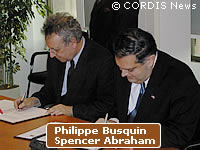EU and US sign partnership agreement on fuel cell technologies
The EU and the United States have formally agreed to launch cooperative projects in the field of fuel cell technologies in order to minimise duplication, overcome technical obstacles, and create common standards and codes in order to stimulate the market. The pledge was contained in an annex to the EU-US scientific cooperation agreement for non nuclear energy, which was signed by Research Commissioner, Philippe Busquin, for the EU and Secretary of State for Energy, Spencer Abraham, for the US at a special ceremony during a conference on the hydrogen economy in Brussels on 16 June. Welcoming the new agreement, Mr Busquin said: 'By pooling EU and US research efforts and resources, we improve our chances of finding a long-term solution to the world's energy and transport problems. Through global partnerships we can work together to develop fuel cell technologies to deliver viable, environmentally sustainable alternatives to fossil fuels.' In his speech to the conference earlier in the day, Mr Abraham said: 'This annex will help unify our approaches to hydrogen research and highlight the importance of international cooperation in the development of hydrogen energy technologies. [W]orking together with international partners, we can leverage scarce resources and advance the schedule for research, development, and deployment of hydrogen [...] technologies.' Specifically, the annex envisages joint initiatives in seven fuel cell related areas, such as demonstrations of fuel cell vehicles and refuelling infrastructures, the use of fuel cells as auxiliary power units, and the development of common codes and standards for fuel cell infrastructure and vehicles. Mr Abraham stressed the importance of global standards to drive the market for fuel cells and hydrogen: 'Businesses and industries that are conducting hydrogen research will have a greater incentive to invest and succeed if they know that the products they develop will have worldwide application, and the sooner we establish these uniform standards, the sooner we can have our hydrogen revolution.' Commission Vice President, Loyola de Palacio, was also present at the event, and made a strong case for increased international cooperation, saying ; 'Europe is running today the world's largest demonstration project of hydrogen fuel cell buses. Such projects are pointing in the right direction but they don't reach the critical mass for market penetration.' Mr Abraham said that he felt the EU-US agreement was the beginning of a new international approach to achieving common goals on hydrogen related technology. A number of European ministers had responded favourably to his proposal to create an International Hydrogen Partnership, he said, and invited representatives from the EU and Member States to take part in a ministerial level conference this autumn to formally define and establish such a body.
Countries
United States

